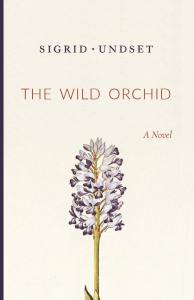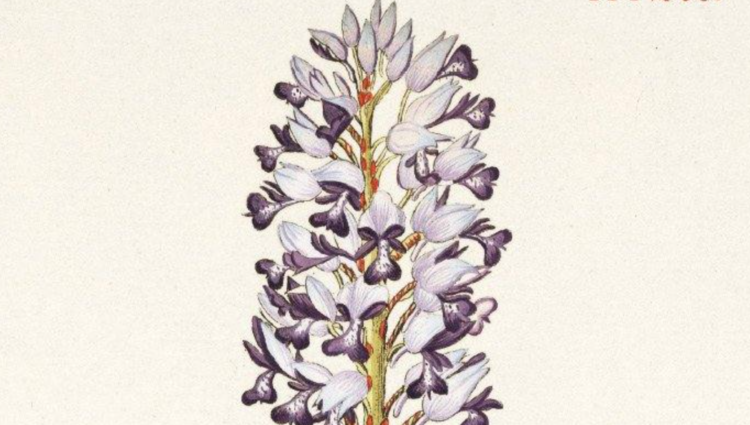Sigrid Undset understood how experiences of joy alongside unfulfilled longings can break the spell of modernity and open a window into the spiritual life. “The Wild Orchid” explores the possibility of spiritual awakening in society that has grown bored with the Christian faith and is seeking new ways to re-enchant the natural world.
 In Sigrid Undset’s novel The Wild Orchid, the children of the Vikings are comfortably middle-class; they are spiritual but not religious. Their state-supported Lutheran ministers have their doubts about the inherited creeds and strive to accommodate the modern zeitgeist. No, this is not the medieval Scandinavian world chronicled by Undset in her Nobel Prize-winning Kristin Lavransdatter trilogy and Master of Hestviken tetralogy. Published in 1929, just a year after she won the Nobel Prize for Literature, The Wild Orchid represents a turn in Undset’s work from the pagan blood feuds, plagues, and perilous pilgrimages of medieval Norway to early twentieth century bourgeois life with its dinner parties, ski outings, and Parisian honeymoons.
In Sigrid Undset’s novel The Wild Orchid, the children of the Vikings are comfortably middle-class; they are spiritual but not religious. Their state-supported Lutheran ministers have their doubts about the inherited creeds and strive to accommodate the modern zeitgeist. No, this is not the medieval Scandinavian world chronicled by Undset in her Nobel Prize-winning Kristin Lavransdatter trilogy and Master of Hestviken tetralogy. Published in 1929, just a year after she won the Nobel Prize for Literature, The Wild Orchid represents a turn in Undset’s work from the pagan blood feuds, plagues, and perilous pilgrimages of medieval Norway to early twentieth century bourgeois life with its dinner parties, ski outings, and Parisian honeymoons.
While the drama is less heroic, The Wild Orchid displays all of Undset’s signature powers for bringing characters to life, plumbing the depths of complex relationships, and tracing her protagonist’s quest for faith and ultimate meaning. The Wild Orchid, re-issued by Cluny Classics in 2019, deserves a wide readership for its penetrating insights into the spiritual confusion of early 20th century Europe—a cultural moment not unlike our own.
The Wild Orchid is the story of Paul Selmer, a young Norwegian coming of age in a world also coming of age in that anxious decade leading up to World War I. His central struggle is with the opposing worldviews found within his splintered family: his mother’s freethinking atheism and the liberal Lutheranism on his father’s side. In the end, Paul finds each of these worldviews wanting and journeys towards a Catholicism that hovered on the margins of Scandinavian life. Where Undset’s historical novels probed the tensions between a deeply rooted paganism and an ascendent Christianity, The Wild Orchid explores the possibility of spiritual awakening in society that has grown bored with the Christian faith and is seeking new ways to re-enchant the natural world.
While he was a teenager, Paul’s parents underwent an amicable divorce, triggered by his mother Julie’s quest for self-fulfillment. Julie Selmer is a boldly drawn character, part of the leading edge of modernists who swept aside inherited rules and prejudices. She stands apart from the main of Norwegian society with her striking dark hair and eyes and her success in managing a lively household of four children while running a thriving publishing business. She taught herself carpentry and remodeled their home in a simple, light-filled style that anticipates Scandinavian modernism.
As in Undset’s medieval novels, the Norwegian landscape of sparkling fjords, wind-swept peaks, and ever-changing skies is lovingly portrayed, its danger now tamed so that it functions as mere scenic backdrop to a leisurely lifestyle. But for Julie Selmer, nature is more—the fount of beauty, truth, and morality. Paul and his mother share a love of gardening and their special project is growing a rare wild Norwegian orchid, the Gymnadenia. Reflecting the love of nature he has learned at home, Paul studies geology at university in anticipation of an academic career. While a student, Paul falls madly in love with an uncultured young store clerk from a fundamentalist home. Paul takes her as his mistress and introduces her to the pleasures of bourgeois life. For Paul, his lover’s unblemished radiance and the rush of romantic feelings she conjures illuminate the pathway to truth and beauty. On a romantic overnight getaway, the couple paddle their canoe to a remote, idyllic island where Paul suggests they swim naked. His mistress is shocked and uncomfortable with the idea, although she eventually complies. Sadly, the nude bathing fails to live up to Paul’s Edenic fantasies and introduces a block in their relationship. Like his naked misadventure, the wild orchid, for which the book is named, turns out to be another disappointment. Despite the efforts and high hopes of Paul and his mother, their orchids produce only small, limpid blooms with the faintest of scents, becoming a symbol of unfulfilled desire and the blocked pathway back to the Garden of Eden.
Despite her disavowal of ever imposing her views, Paul finds himself haunted by a fear of saying or thinking anything that his mother would disapprove of. But learning to think for himself, he comes to question his mother’s atheism. While Julie Selmer condemns the narrowness of the older generations, Paul’s notices that the freethinkers have not expanded their circle of affections but wiped them out, leaving only the ego. The freethinkers speak glowingly of global harmony and yet “each heart burns for itself alone…” The contradictions of his mother’s ethic of doing what feels natural becomes apparent during Paul’s time in the military. Anticipating Tom Holland’s argument in Dominion, the freethinkers who rejected Christianity are shown to be deeply indebted to Christendom for the values and dispositions they took to be natural. His mother’s ethic might work for well-bred people like herself but in a military camp Paul saw that “the world will not be retransformed into the Garden of Eden simply by abolishing all morality except good taste. Tastes differ—and the…old Adam was by nature omnivorous and only asked to have its desires gratified as soon as it felt them.“
Paul’s debates with his future brother-in-law Halstein, a minister in the state Lutheran church, reveal the shallowness of liberal Protestantism. Halstein argues that Christianity must constantly evolve: “It is a living faith, not doctrinal faith…We can only remain in the spirit of the Reformation if we have the courage to experience Christianity in our own way.” In early 20th century Norway, that meant skepticism about the divinity of Christ and acceptance of the younger generation’s practice of cohabitation. Unsure of his own religious beliefs, pastor Halstein looks to ground his spirituality in nature. He avers, “…the very feeling of unity with nature which makes a man call himself a son of the mountains or son of the sea—that in itself is a spiritual force of immense value—.” Paul, a geologist who has taken long expeditions into remote, northern areas, sees the naivete in this pampered, urbanite’s imagined oneness with nature. Paul replies:
I am a tiny little dot in nature, and yet I delude myself into thinking that the whole mighty landscape feels and thinks in much the same way as I do… I can acquire nature’s secrets, but nature doesn’t care a curse for acquiring mine—it can be sure of acquiring my corpse and incorporating it with itself by a process of corruption.
Dismayed by the Lutheran minister’s cavalier attitude toward truth, Paul seeks to discover whether Christianity is just a collection of accumulated opinions or a divine revelation worthy of one’s full devotion. Paul discovers wisdom in his father’s conviction that ideas are true because they correspond with objective reality, not because they are up to date. Paul’s father observes that “to take comfort in the thought that one is in league with the future is equivalent to flattering oneself that one is on the side of the victors…” His father scoffs at the young revolutionaries who “imagined they were dancing before the ark, when they were just drifting with the stream.” Paul concludes that a progressive Christianity accommodated to the sensibilities and sexual mores of the modern world offers little more than his mother’s atheism.
By coincidence, Paul rents a room from a Catholic widow and becomes fascinated with the religious paraphernalia in her home and her small circle of fellow Catholics. Paul is impressed with the earnest devotion of the beleaguered company of believers. He comes to the startingly realization that if the Christian message were true, then “the whole of life was inconceivably more wonderful and dangerous and rich, so unspeakably more serious and valuable than he had ever dreamt.” After taking several small steps towards Christ, Paul experiences a series of letdowns that undermine his fledgling faith and leave him bitter towards God. Disappointed in romance, nature, academics, and religion, he turns to making money and as the novel concludes he is a preoccupied businessman in pursuit of bourgeois comforts. Still, unexpected glimpses of beauty such as his young daughter’s capacity for wholehearted delight intrude upon his mundane existence with a foretaste of a realm beyond —“a mirage of the distant city—life in its archetype.” As C. S. Lewis would later elaborate, Undset understood how experiences of joy alongside unfulfilled longings can break the spell of modernity and open a window into the spiritual life. Paul recognizes that only a faith that apprehends the God who is there and is not silent, who is wholly other and not a product of our imagination, is worth living for. Paul prays, and his heart is warmed: “Every new thing he read and learnt about the faith was like an armful of fresh wood thrown upon the fire. The whole of life was brightened and warmed by it…” And so, Paul begins a process of conversion that continues in the sequel The Burning Bush.
The Imaginative Conservative applies the principle of appreciation to the discussion of culture and politics—we approach dialogue with magnanimity rather than with mere civility. Will you help us remain a refreshing oasis in the increasingly contentious arena of modern discourse? Please consider donating now.
The featured image is


